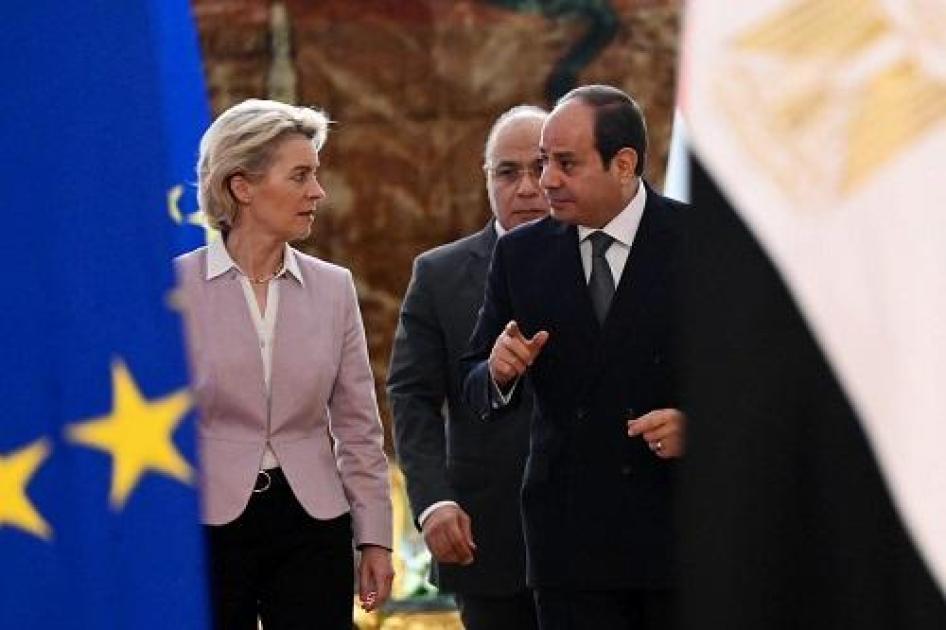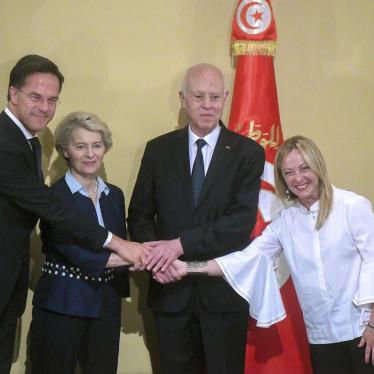(Brussels) – The European Union’s negotiations on an upgraded bilateral partnership with Egypt risk missing an opportunity to press for human rights reforms in the midst of the country’s ongoing economic and human rights crises, Human Rights Watch said today, in releasing a December 6, 2023, letter to EU leaders and member states.
The partnership will likely include additional political and economic support for Egypt without addressing some of the root causes of the country’s dire economic situation, including its brutal and systematic repression. The EU will risk complicity in further abuses unless it takes steps to ensure it is not funding them. Human Rights Watch criticized the proposed partnership and the EU’s longstanding reluctance to address the Egyptian government’s abuses, and urged the bloc to leverage its upcoming support package to secure structural improvements to Egypt’s abysmal human rights record.
“Egypt’s economic woes are deeply intertwined with its ongoing human rights crisis, and you can’t address one without the other,” said Claudio Francavilla, senior EU advocate at Human Rights Watch. “Pervasive repression, mismanagement, and corruption have brought Egypt to the brink of economic collapse and will continue unabated unless Egypt’s allies get serious about the need for human rights progress and reforms.”
The negotiations for a “strategic partnership” with Egypt follow EU Commission President Ursula von der Leyen’s regrettable pledge in July to use the controversial EU-Tunisia deal as a “blueprint” for the region. That approach implies providing financial incentives for Mediterranean countries to prevent migrants’ departures toward Europe, while overlooking their poor human rights records and emboldening authoritarian rule in the region.
Since President Abdel Fattah al-Sisi’s military coup in 2013, Egypt has been ruled with an iron fist. Thousands of perceived critics have been arbitrarily jailed, often in horrendous conditions. The judiciary has been reduced to an obedient tool of the government’s repression; and opposition, independent civil society, and free media have been nearly wiped out. This has made it virtually impossible for Egyptians to monitor, expose, and criticize their government’s economic mismanagement, corruption, and human rights abuses. Al-Sisi has just secured a third six-year term in office, following a campaign of arrests, intimidation, and onerous requirements for candidates that effectively prevented any meaningful competition.
Under his rule, the military has strengthened its control over all aspects of Egyptians’ lives. In December 2020 and February 2021, the government arrested businessmen Safwan Thabet and Seif Thabet, reportedly for their refusal to surrender their shares in their company to a state-owned business. The two were finally released in January 2023. Egyptian authorities also failed to credibly investigate the suspicious death of a renowned economist, Ayman Hadhoud, who was forcibly disappeared on February 5, 2022, and died in detention one month later. Egypt’s security forces are notorious for their systematic torture and other ill-treatment, and denial of timely and adequate health care to people in detention.
The government’s abusive policies have contributed to a spiraling economic crisis that, according to analysts, makes Egypt second only to Ukraine as a country most at-risk of defaulting on its debt. In January, the International Monetary Fund approved a US$3 billion loan agreement with Egypt, the fourth since 2016. While the agreement includes some efforts to address deep-seated structural problems such as the opaque role of the military in the economy and inadequate social protection, other provisions, such as austerity measures and the sale of state assets, risk harming rights.
Yet the EU seems determined to insist only on the implementation of the IMF requests as preconditions to provide further EU direct support to Egypt. Human rights continue to be relegated to sporadic, largely fruitless discussions with the Egyptian authorities, which are expected to become even less productive as Egyptian authorities point to the double standards within parts of the EU toward the ongoing Gaza crisis.
The enhanced EU support package, still under negotiation both bilaterally with Egypt and among EU member states, is expected to include at least hundreds of millions of euros of direct support. It is also expected to pave the way for loans by the European Investment Banks and European Bank for Reconstruction and Development that could lead to a cash influx of €9 billion to Egypt.
Migration remains a key component of the EU’s bilateral cooperation with Egypt. The EU already approved €110 million (about $120 million) to boost Egypt’s border and coast guard capabilities, and is expected to provide three search and rescue boats to Egypt. More money is expected to flow as part of the new support package.
Human Rights Watch has documented serious abuses by the Egyptian authorities against asylum seekers and refugees, including arbitrary detention and physical abuse, detention of children, unlawful deportation of Eritrean asylum seekers amounting to refoulement, and failure to protect vulnerable refugees and asylum seekers from pervasive sexual violence. Egypt has also blocked people fleeing Sudan’s conflict from entering without visas, creating life-threatening delays in access to asylum.
There are also growing concerns about a possible mass influx of people into Egypt from Gaza, where the Israeli government’s actions against Gaza’s civilian population, including war crimes, have created a humanitarian catastrophe. Human Rights Watch has warned Israel’s and Egypt’s international partners about the risk of complicity in the war crime of forced displacement.
Egypt’s North Sinai region, which borders Gaza, is also a conflict area where Egypt’s military and police forces are committing serious and widespread abuses against civilians. Some of these abuses, part of an ongoing campaign against members of the local ISIS affiliate, the Sinai Province group, amount to war crimes.
Any bilateral cooperation on migration with Egypt should be preceded by thorough due diligence to ensure that no EU funding contributes to abuses against migrants, refugees, or asylum seekers. The EU should at the outset press Egypt to end the pervasive practice of torture and other forms of persecution, and ensure that those fleeing violations have access to international protection.
“Stepping up support for Egypt’s abusive authorities without human rights guarantees is a guarantee for further human rights abuses,” Francavilla said. “The EU knows that all too well, but is so blinded by its obsession to contain migration at any cost that it is ready to trash its own human rights commitments, embolden oppression, and accept complicity in abuses.”








